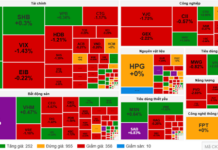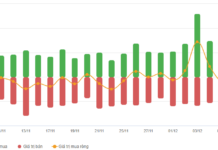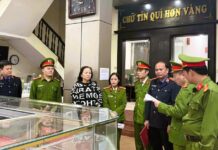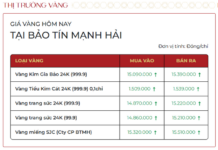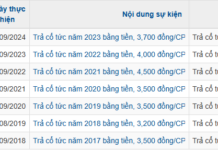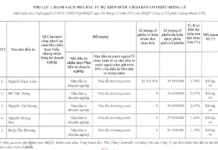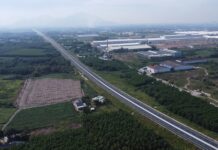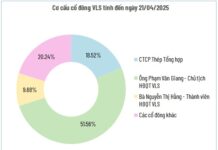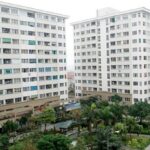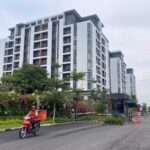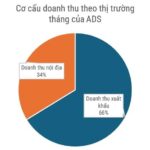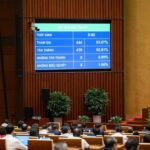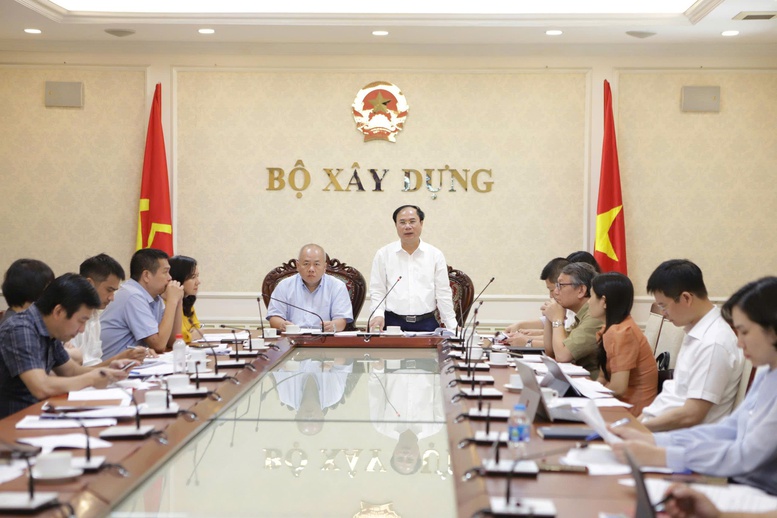
The meeting was co-chaired by Vice Minister of Construction Nguyen Van Sinh and Vice Minister of Finance Do Thanh Trung – Photo: Construction Newspaper
On September 4, the Ministry of Construction organized a discussion meeting to gather opinions on the draft Government Decree detailing the National Housing Fund and measures to implement Resolution No. 201/2025/QH15 dated May 29, 2025, of the National Assembly.
The Ministry of Construction has developed a draft on the establishment of the National Housing Fund, which has been sent out for feedback from ministries, sectors, and localities. The draft is now finalized and ready to be submitted to the Government.
People’s Committees at the provincial level establish the fund locally and act as the owner representative to manage the fund
Introducing the draft, Ms. Tong Thi Hanh, Director of the Housing and Real Estate Market Management Department of the Ministry of Construction, said that this draft decree consists of 7 chapters and 27 articles.
Notably, Chapter 2 clarifies the legal status and operational objectives. Accordingly, the Government establishes the fund and assigns the Ministry of Construction as the owner representative and manager. People’s Committees at the provincial level establish the fund locally and act as the owner representative to manage the fund.
Regarding the financial management mechanism, the People’s Committees at the provincial level decide on the establishment of a new fund or the reorganization of an existing fund managed by the provincial People’s Committee or entrust it to another local financial fund. However, it must operate according to the fund’s purpose as specified in Resolution No. 201/2025/QH15 and this Decree.
In case the provincial People’s Committee decides to entrust the local development investment fund or another local financial fund to manage the local housing fund, the entrusted fund must establish a steering committee (Steering Committee) for the local housing fund.
Chapter 2 also clarifies the fund’s operational objectives, principles, tasks, and rights; capital sources for fund operations; and the fund’s organizational structure.
Chapter 3, on Financial Management, specifies the financial regime (including salary and allowance policies for management staff and employees) and the management and use of the fund’s assets following the regulations applicable to public non-business units. Accordingly, the fund organizes its accounting system following legal regulations on accounting and performs accounting and statistics tasks as prescribed by law…
Chapter 4, on Receiving, Managing, and Using Support and Contributions from Domestic and Foreign Organizations and Individuals, clarifies the principles, methods, procedures, and authority to decide on receiving support and contributions from organizations and individuals. It also covers the procedures and content of the document for receiving support and contributions, the actual reception of support and contributions, confirmation of receipt, and the use of these funds.
Chapter 5, on Investment, Creation, Management, and Operation of Rental Housing, outlines the principles of investing and creating housing; the procedures and forms of investing in and building social housing for the fund; the subjects of housing rental; rental prices and procedures; and the management and operation of housing.
Chapter 6, on Inspection of Fund Activities, states that the fund is responsible for developing and issuing an internal inspection regulation to ensure effective operations, in line with its functions, tasks, and authority as prescribed in this Decree.
At the same time, the fund is responsible for periodically or unexpectedly reporting to the Ministry of Construction and the provincial People’s Committees on its activities, capital and asset management, difficulties, and obstacles and proposing solutions.
Chapter 7 covers the amendment and supplementation of a number of articles of Decree No. 192/2025/ND-CP dated July 1, 2025, and Resolution No. 201/2025/QH15, and specifies the responsibilities of ministries, sectors, and localities; the fund’s responsibilities; transitional implementation regulations; and enforcement provisions.
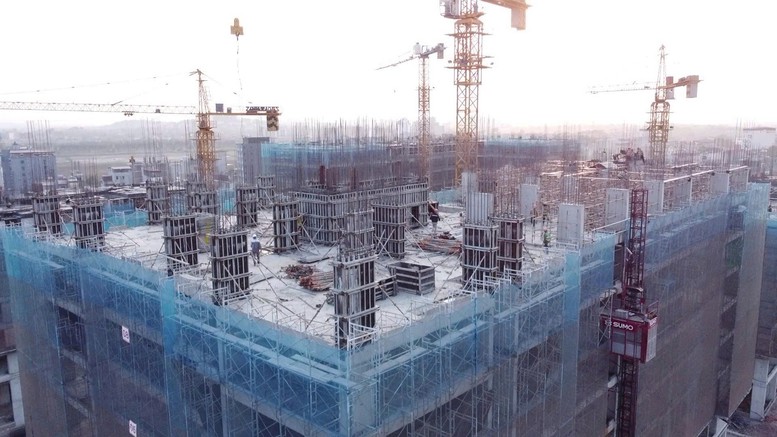
The National Housing Fund only provides rental services and does not engage in buying, selling, or trading houses
The National Housing Fund only guarantees rental services and does not engage in buying, selling, or trading houses
Providing additional information on the establishment of the National Housing Fund, Mr. Do Thanh Trung, Vice Minister of Finance, said: “Previously, we followed a model where the fund was outside the state budget but operated as a one-member limited liability company.”
“This [new fund] originates from the spirit of Resolution No. 201/2025/QH15, which pilots some special mechanisms and policies for social housing development. It states that this fund is only for renting, with ‘only entry and no exit.’ In other words, the fund does not engage in buying, selling, or trading houses but ensures the provision of rental services, formed from the state budget and legal contributions from other sources,” explained the Vice Minister of Finance.
Therefore, the Ministry of Finance studied the direction of a fund outside the state budget but operating as a public non-business unit. Thus, the fund has the function of ensuring the provision of rental services rather than houses, fulfilling the political tasks assigned by the State.
In terms of operation, the fund will initially have state support in terms of charter capital and operating expenses, both at the central and local levels. After the fund is operational and starts generating revenue, it will self-finance its expenses. Subsequently, the fund will perform other tasks, make depreciation provisions, and ensure the preservation of state assets.
“The relationship between the central and local funds is also an important issue to consider. In large cities and localities with developed industries, economic zones, and industrial parks, the relationship between the two funds is crucial for regulating demand, project locations, and efficient fund utilization,” said Vice Minister of Finance Do Thanh Trung.
A representative of the Hanoi Department of Construction shared their opinion: “If we leave the task of renting to businesses, it will be challenging to attract investors. Therefore, transferring this responsibility to the state will bring long-term value, and the state will not have to continuously allocate social housing funds. Since land resources are limited, we cannot allocate social housing indefinitely. Thus, this fund will eventually create a cycle of rental demand.”
Additionally, there should be a mechanism to regulate the selection of specific projects to prevent enterprises from offloading their excess inventory to the state as a ‘release channel.’ At the same time, there should be regulations on construction quality. When the state purchases housing, it is necessary to avoid situations where developers reduce construction quality to increase profits. Quality control should be implemented from the time of purchase to the time of project acceptance to prevent state fund wastage.
The representative of the Ho Chi Minh City Department of Construction proposed having separate sections for the National Housing Fund and the Local Housing Fund. Additionally, they suggested supplementing the working relationship and coordination between the local housing funds and the national fund.
Regarding the objectives, the Ho Chi Minh City Department of Construction proposed adding the creation of a housing fund by allocating resettlement housing. In the past time, the city has also bought back resettlement housing to convert it into social housing or official residence to serve the subjects of official residence as well as social housing.
“The Ministry of Construction should also have a flexible mechanism to identify subjects, especially those renting in separate houses in residential areas. This subject accounts for a large proportion in Ho Chi Minh City,” said the representative of the Ho Chi Minh City Department of Construction.
Mr. Nguyen Van Sinh, Vice Minister of Construction, affirmed that the Ministry of Construction would absorb the opinions and contributions of agencies and ministries to complete and submit the draft to the Government within the prescribed time frame.
“A Modest Proposal: Raising Income Limits for Social Housing Applicants”
The Ministry of Construction is drafting a decree to amend and supplement several articles of Decree No. 100/2024/ND-CP, dated July 26, 2024. This decree provides detailed regulations on the Law on Social Housing, encompassing its development and management.
The Latest Directive on Creating a Fund for Ho Chi Minh City’s Relocation Housing and Land
The Department of Construction has been tasked by the Ho Chi Minh City People’s Committee to establish a fund for housing and land to serve resettlement purposes. This fund will be based on the needs of the resettled community and the proposals for constructing new resettlement areas by various units. A report on the progress of this task must be submitted by October 15th, ensuring a swift and efficient process.
“Can a 20 Million VND Income Grant You Social Housing? Understanding the Requirements”
The Ministry of Construction has proposed an increase in the income limit for individuals eligible to purchase social housing. The new proposal suggests a maximum monthly income of 20 million VND, a significant jump from the current limit of 15 million VND. This move aims to extend the benefits of social housing to a wider range of low- and middle-income earners, providing them with access to affordable and secure housing options.
The New Housing Development: A Race to the Finish Line for Can Tho’s Social Housing Investors
The Can Tho City Department of Construction has urged six investors to expedite the implementation and progress of their social housing projects in the area. The department’s recent correspondence emphasizes the importance of meeting the targets set by the Prime Minister for the year 2025 and the period between 2026 and 2030.

